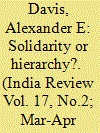| Srl | Item |
| 1 |
ID:
159373


|
|
|
|
|
| Summary/Abstract |
India has been a major victim of Islamist terrorism and has long fought against an array of Islamist terrorist groups. Since the 9/11 terrorist attacks, India's previously lonely struggle against terrorism has taken place against the background of the US-led Global War on Terror (GWOT). After outlining India's Islamist terrorist challenge, this article examines India's evolving approach to counterterrorism and how the GWOT has influenced it. It concludes that India has adopted a localized, defensive, law-and-order approach to counterterrorism which has evolved in response to various attacks over the years but still remains seriously underdeveloped. The GWOT has influenced Indian counterterrorism in important ways, although its influence has been subtle and indirect rather than transformative. The GWOT has enhanced Indo-American counterterror cooperation, shaped India's terror environment by launching the war in Afghanistan and enriched Indian counterterrorism with American experience. Just as important, it has also had an impact on India's debate on counterterrorism, civil liberties and human rights.
|
|
|
|
|
|
|
|
|
|
|
|
|
|
|
|
| 2 |
ID:
159375


|
|
|
|
|
| Summary/Abstract |
The idea of solidarity between India and Africa has long drawn heavily from historical sources, including the anti-colonial legacies of Jawaharlal Nehru and Mahatma Gandhi, and ongoing frustration with a hierarchical world order that subordinates them from international decision-making. In this article, I consider the historical ambivalence embedded within the ways in which India now identifies with and talks about “Africa.” I argue that elements of the Modi government’s political project is changing the meaning of India’s identification with “Africa.” After a brief theoretical discussion and a consideration of the historical context, I look at two recent examples in which India’s relationship with Africa was narrated: the 2015 India–Africa Forum Summit and the recent furor over attacks on African students in India. This has already caused upset between India and specific African states. Although still premised on shared resistance to hierarchy, there are signs that the idea of “India-Africa relations” itself can become a hierarchical discourse.
|
|
|
|
|
|
|
|
|
|
|
|
|
|
|
|
| 3 |
ID:
159374


|
|
|
|
|
| Summary/Abstract |
This article examines whether New Delhi’s engagement with the ongoing conflict in Syria (and Iraq) demonstrates that India is leaving behind its traditionally cautious and risk-averse foreign policy stance and becoming a more proactive international actor. India has not engaged actively with and has not tried to wield substantial influence over the course of this conflict; instead, after a moderate burst of diplomatic activity in the second half of 2011 India has largely tried to avoid involvement. There are some indications that India is trying to become more proactive in its region, in trade diplomacy, and toward a rising China; yet, results sometimes fail to meet ambitions. Accordingly, the article concludes that, on balance, India’s foreign policy orientation has not yet changed significantly; it remains a cautious, reactive international actor unwilling to engage with and actively shape the outcome of crucial crises or conflicts.
|
|
|
|
|
|
|
|
|
|
|
|
|
|
|
|